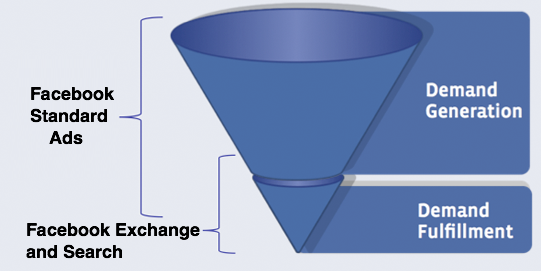If you’re not familiar with Facebook as a social marketing platform, here’s a brief introduction to how it works. Marketers get a hint of what Facebook users are interested in based on what they “Like” and measure the value of their campaigns by a very nontraditional metric called engagement. The belief being that engagement drives sales. It’s a simple idea and it has made Facebook a great place for active brands and social advertisers.
Now, with its new Facebook Exchange, Facebook evolves into a very large source of inventory for display advertisers. In short, the new RTB (real-time-bidding) service will allow advertisers to reach users on the social network based on their browsing history, not just what they “Like” or list as their interests. This means that users who visit third-party websites can later be shown ads related to their web browsing when they return to Facebook, which is also known as retargeting. Clearly it brings in a new and potentially huge revenue source. But is it worth forgetting the fact that most people consider display advertising on a social networking website completely uncool?
Cool or not, the move makes sense because although Facebook already leads the overall US display advertising market which totaled $12.4 billion in 2011, with the social network’s share of market revenue growing to 14% in 2011 from 11.5% in 2010, it can take an even larger slice of the pie. If Facebook Exchange gains traction, Facebook could beat eMarketer’s estimate that Facebook’s share will grow to 16.8% of the predicted $15.39 billion market in 2012. This move pretty much guarantees that growth.
According to 360i, “…for direct marketers, Facebook ads have been a harder sell. With the advent of Facebook Exchange, this perception could dramatically change. By opening its inventory up to DSPs for retargeting purposes, Facebook is adding the lower portion display marketing funnel, making it complete.”

How Facebook Exchange works.
(provided by TechCrunch)
- A user visits a travel site that’s hired a DSP rigged up with Facebook Exchange
- A cookie is dropped on that user’s computer, typically when they’ve shown purchase intent
- If the user fails to make a purchase, or the advertiser wants to market to them more, the DSP contacts Facebook and gives them the user they wish to target’s anonymous User ID
- The advertiser pre-loads creative for ads that would target that user
- When the user visits Facebook it recognizes the cookie dropped by the DSP
- The DSP is notified and allowed to make a real-time bid to show the user ads
- The DSPs with the highest bids get their highly-targeted ads shown to the user
- If the user disapproves of being shown the ad and ‘X’s it out, they’re shown a link to the DSP where they can opt out of future Facebook Exchange ads
Although some argue that this could lead to more relevant advertisements being shown to users, you get the feeling that the company is just trying to rationalize short-term financial gains that it will reap from this move. Because clearly social marketing is thought of by many as the next evolution in advertising, and companies like Facebook helped create that belief. Let’s hope this doesn’t turn out to be Facebook’s long term strategy.
Feedback from the blogosphere.
Kori Handy (Sr. UX/UI designer at Hotwire)
“Everyone is forgetting something here….Ads are not cool…and Facebook is a social network to connect with friends and family, not get spammed with ads…Google however is a search engine with the normal users expectation to see relevant ads in search results..When I am chatting with friends and family on FB, seeing ads and getting “cached” is not viable or relevant to users because we don’t use FB to find products or get sold on something…And bribing users to watch videos with FB credits is not scalable and will not last, as the poor conversions will tell the truth.. Don’t get me wrong I love FB but I don’t like adbook…”
Henrik Hagglund (Works at Enrio)
“I think that you are seriously wrong. You could argue that ads are not cool but to say that search is all different from social is a misstake. Both ride on the interest graph and as long as ads not dominating the display and is percieved as relevant to the user, clicks will definitly happen and …cha ching! money will be made”
Sarah Wulfeck
““Some people just dislike being targeted.”
File that one under “duh.”
Also, maybe having worked in digital media for years, I’m too close to this, but haven’t we all decided that display advertising is dying fast?
I know, I know, the data says that lots of people are still clicking on banners and ad placements. (Punch the monkey, punch the monkey, punch the monkey!)
But as none of my “early-adopter” friends nor I do, isn’t it obvious that the mainstream will continue to follow a similar behavioral pattern?
Why are we still fixated on an old marketing model, and when are people going to start putting serious dollars into innovative brand experiences and content strategies?”
What do you think, is this a good move or a bad move for Facebook?

